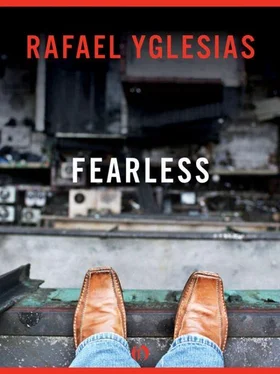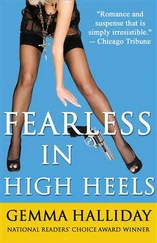The teenager lunged at Max’s chest with the blade. Instinctively, Max moved one step to his right. He didn’t shift far enough. The knife sank into him. Max lowered his head and watched as the metal disappeared into his arm and chest. He felt nothing. With the blade all the way in, the teenager’s face was only inches from Max’s; he stared at the point of entry, stunned, his mouth sagging open. The mugger’s eyes were small and frightened. Max didn’t like him. He put his hand on the kid’s chest and pushed him away. He didn’t want to die looking into scared eyes.
The mugger stumbled back, tripped over his feet and fell on his ass. Max felt the point of the blade in his armpit. He realized he wasn’t cut. The stupid kid had stuck the knife in the space below Max’s armpit, the gap between his arm and chest. He had torn Max’s polo shirt, but missed everything else. For a moment the knife hung there, caught by the fabric. Max raised his arm and the switchblade fell to the ground.
The teenager jumped to his feet and ran away, heading uptown. Bewildered, Max peered into the jagged hole in his shirt. No cut, no scrape, no wound of any kind.
“They can’t kill me,” he said aloud, the traffic drowning his mild tone. “They want to kill me,” he admitted and he smiled affectionately at the West Side skyline, at the architecture of the city of his birth, “but they can’t.”
Max walked the fifty blocks to his office. The city was exposed to a bright sun, heating up the closely packed corridors between the tall buildings. New Yorkers walking in the oven were smoked by fumes of car exhaust and street cooking. Max watched their faces, fascinated. The midtown blocks were jammed with people of color and clothing of color and there were lots of glistening skin and bold hairdos. Max enjoyed their company, striding hard through the unbreathable air. He couldn’t hear their conversation. It was too hot to hear: the city’s noise was dampened into a continuous background roar. The only sound Max could distinguish was his own panting. He arrived soaked through from perspiration. His hair was dripping wet, his polo shirt stuck to his body. At the chilling touch of the office’s air-conditioning his skin crawled. He walked in pulling at his shirt.
They surrounded him in seconds: Gladys the bookkeeper, Scott and Warren, the two draftsmen, and Betty the secretary. Their eyes all looked puffy; Max was pleased they had cried for Jeff; pleased and a little amused. Betty was prepared to hug him but she held back at his obvious discomfort. Gladys, however, was too upset or didn’t care. She rushed into Max’s arms. Max didn’t feel her plump squat elderly body; he got the clammy embrace of his own clothing.
“My God, Max,” Gladys said. “What a nightmare.”
“Yes,” Max said and moved her away. He picked at his polo shirt, peeling it off him. The shirt reclaimed him as soon as he let go. He decided decorum was preposterous. Bending over, Max pulled at what felt like his own skin. He shed it.
“Max,” Warren said with a hint of surprise at the nudity. The office wasn’t formal, but it wasn’t a dormitory either. In fact, Max usually wore a dress shirt, if not a jacket.
Gladys picked up the shirt and commented, “It’s torn,” in a wondering singsong, studying the hole.
“Could you get me a towel?” he asked Betty. Betty was a pretty woman in her twenties. She stared at Max’s bare chest. Her look wasn’t lustful. She seemed curious about her boss’s chest, though. What was she thinking — Gee, his chest hairs aren’t gray? Max wished she wanted him, but he was too old, and probably too something else, even if he were young. Betty was a cheerful person: she went to concerts, she danced, she laughed a lot, she cared about her long nails and her thick auburn hair, she enjoyed shopping. She was happy, that’s the name for it, Max decided. I’m not. Even if I were young she’d think I was old.
Meanwhile she brought him a towel from the bathroom.
“Come into my office,” Max said. His employees followed him into his and Jeff’s room. The offices were the front half of a loft, rented from a comic book distributer who used the windowless back half for storage. The draftsmen had space with a window on an alley; Gladys and Betty were opposite with a view of a parking lot. The partners had the large front room to themselves, their desks side by side, facing two floor-to-ceiling windows overlooking Seventh Avenue and the concrete bunkers of the Fashion Institute of Technology, an ugly view that Max liked to believe was an encouragement. No design of his, no matter how practical or commercial, was as defeated as what he looked at.
Max was unmoved by the sight of Jeff’s desk. The empty chair and spread of unfinished designs weren’t poignant or even unusual. It was normal for Jeff to be away, busy with lots of errands and family emergencies and long lunches and of course his daily hour in the gym from eleven to twelve. The deserted workstation, ready for his return, was more embittering than heart-tugging.
“Everyone’s called,” Gladys said.
“Yeah, practically every client,” Scott said and sighed, as if he were exhausted by all the conversations.
“We’re so proud of what you did,” Betty said. She flashed an embarrassed smile, a girlish smile.
“What I did?” Max looked at his cleared desk, at the row of perfectly sharpened pencils that he always made sure to leave ready to greet him the next morning, tips clean and sleek, ready to be his dutiful tools. He turned away from them.
“The children,” Gladys said. Scott and Warren nodded respectfully.
“You were so brave,” Betty said. Max understood why Betty was peering at his bare chest: she was looking for signs of the crash.
“Thank you. I know this is as much a shock to you as it is to me or Jeff’s family. He spent as much time here—” Max stopped, thinking, No, he didn’t. “Anyway, I know you’re all feeling upset but I want to give you as much notice as possible. We have — what do you think, Warren? — about three months’ work?”
“I guess,” Warren said reluctantly.
“I don’t want to keep the firm going after that. Even if we complete the work sooner than three months — in fact, I’d like us to get it done as fast as possible — but even if we finish it this week, you’ll all be on salary through October. You can start looking for jobs right away and I’ll help out, think up people to call, give recommendations—”
“Max,” Gladys lowered her usually high pitch, as if the deeper sound couldn’t be heard by the others. “Not now. Don’t make decisions right now.”
“I know what you’re thinking. And it makes sense. But it isn’t like that. I intend to go on working. But I drew these houses,” he gestured at the Zuckerman Long Island drawings, “and Nutty Nick stores for money. I liked doing it, partly because I liked supporting my family and being part of the world. Who was I to think I could do better than anyone else? I eat at McDonald’s. I even kind of look forward to their french fries. So why should I disdain their architecture? I’ve never met a king, how can I expect to build cathedrals? I don’t even know the CEO of a corporation, so who am I to think I should be designing Citicorp?”
The four people he employed looked back at him with the attentive and uncomprehending stares of kindergartners politely waiting for snack time.
“Don’t you see the mistake I made? It has nothing to do with whether I’m good enough to design what I want to design. I don’t have to be entitled to it. I don’t have to have talent. I don’t need permission. All I need is my own desire. If that’s strong enough then I’m strong enough.”
Читать дальше












